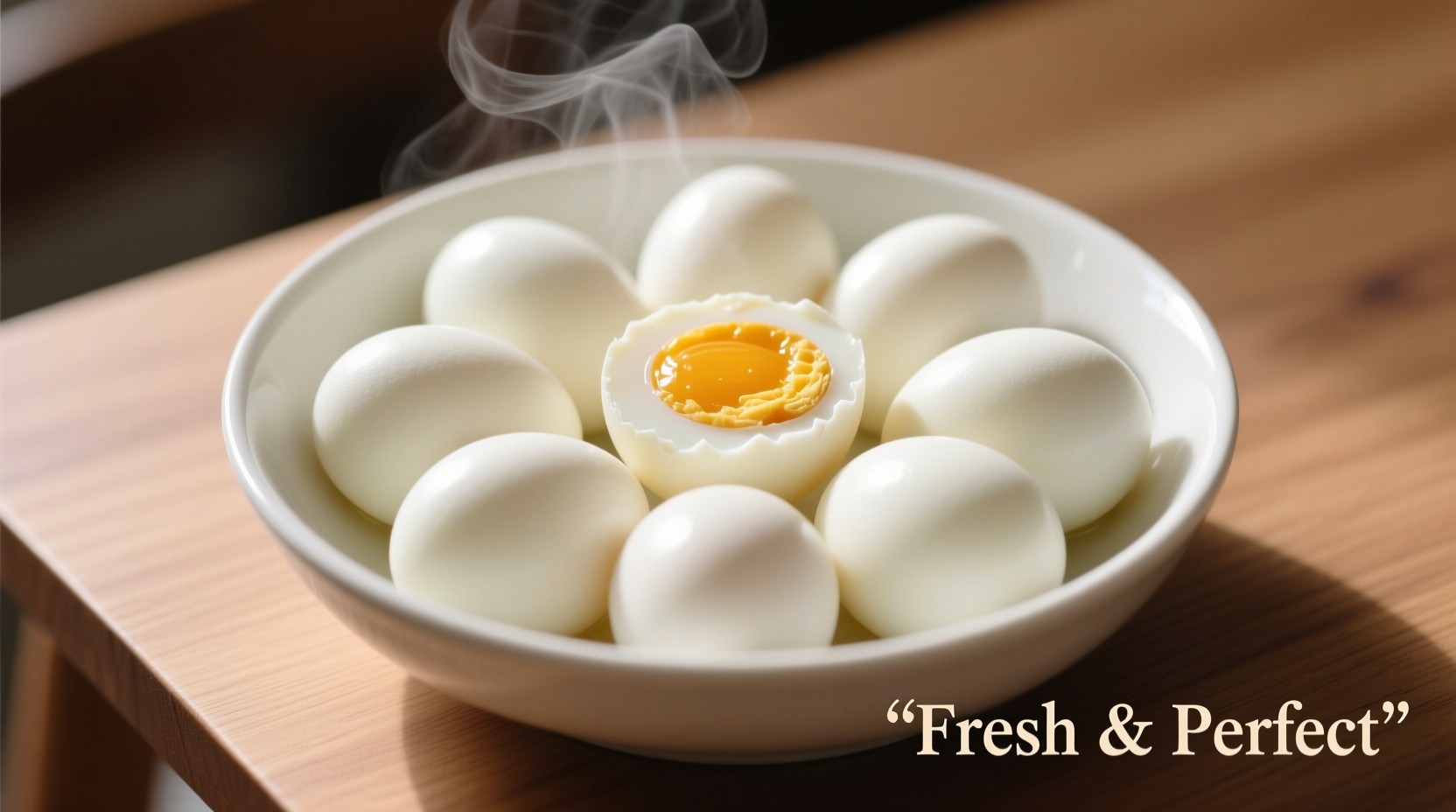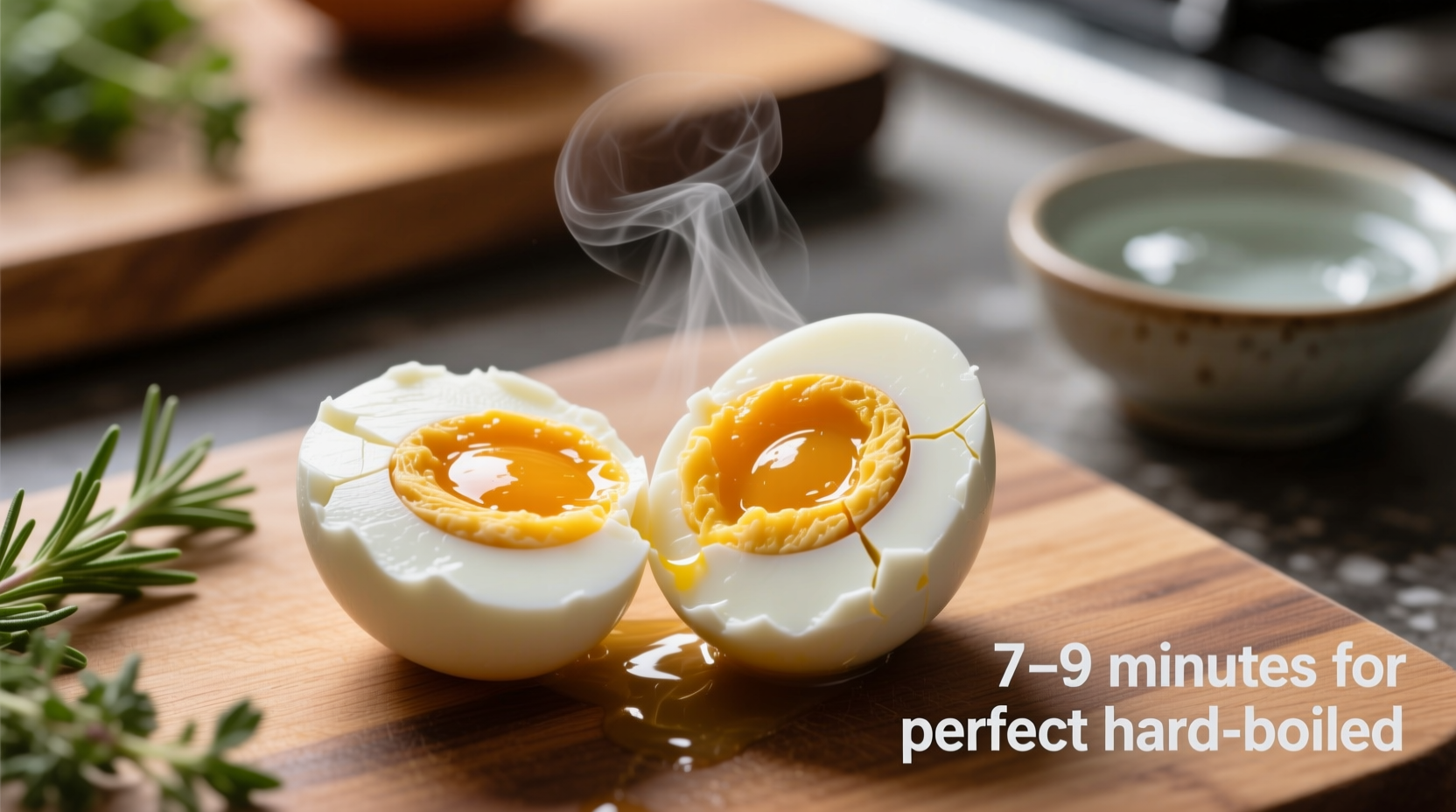Hard-boiled eggs should cook for 10-12 minutes after the water reaches a rolling boil for large eggs at sea level. Start with room-temperature eggs in cold water, bring to a boil, then reduce to a gentle simmer. Adjust timing based on egg size: small eggs need 8-10 minutes, medium 9-11 minutes, and extra-large up to 13 minutes.
Getting perfectly cooked hard-boiled eggs every time isn't just about setting a timer—it's understanding the science behind the process and adapting to your specific kitchen conditions. Whether you're meal prepping for the week or making deviled eggs for a party, precise timing ensures yolks that are fully set but not chalky, with whites that are tender rather than rubbery.
The Science Behind Perfect Hard-Boiled Eggs
Egg proteins begin to coagulate at specific temperatures: egg whites set around 140-180°F (60-82°C) while yolks firm up between 149-158°F (65-70°C). When you drop eggs into boiling water, the rapid temperature change causes the proteins to set too quickly, often leading to rubbery textures and potential cracking. Starting with cold water allows for more gradual, even heating.
According to the USDA Food Safety and Inspection Service, properly cooked hard-boiled eggs reach an internal temperature of 160°F (71°C), which eliminates potential salmonella concerns while maintaining optimal texture.
Your Step-by-Step Cooking Process
Follow this proven method for consistent results every time you make hard-boiled eggs:
Preparation Phase: Setting Up for Success
Begin with eggs that have reached room temperature—this reduces thermal shock when placing them in water. If your eggs are refrigerated, let them sit out for 20-30 minutes before cooking. Use a saucepan large enough to hold eggs in a single layer with at least 1 inch of water covering them.
| Egg Size | Water Coverage | Starting Temperature | Recommended Timing |
|---|---|---|---|
| Small | 1 inch above eggs | Cold water start | 8-10 minutes |
| Medium | 1 inch above eggs | Cold water start | 9-11 minutes |
| Large | 1 inch above eggs | Cold water start | 10-12 minutes |
| Extra-Large | 1 inch above eggs | Cold water start | 11-13 minutes |
Cooking Phase: Precision Timing
Place eggs gently in the saucepan and cover with cold water. Add 1 teaspoon of vinegar to help prevent cracking. Bring the water to a rolling boil over medium-high heat, then immediately reduce to a gentle simmer. Set your timer based on egg size as shown in the table above.

Cooling Phase: The Critical Final Step
When the timer ends, immediately transfer eggs to an ice bath for at least 10 minutes. This rapid cooling stops the cooking process, prevents the greenish-gray ring around yolks (caused by iron-sulfur reactions), and makes peeling significantly easier. The American Egg Board confirms that proper cooling is essential for both food safety and optimal texture.
Troubleshooting Common Hard-Boiled Egg Problems
Even with perfect timing, issues can arise. Here's how to solve them:
Green Yolk Rings
This unappetizing ring forms when eggs cook too long or cool too slowly. The iron in the yolk reacts with sulfur in the white. Solution: Reduce cooking time by 1-2 minutes and ensure immediate transfer to an ice bath.
Difficult Peeling
Fresh eggs contain more carbon dioxide, creating a stronger bond between the membrane and shell. For easier peeling, use eggs that are 7-10 days old. Adding 1/2 teaspoon of baking soda to the cooking water raises the pH, loosening the membrane attachment.
Cracked Shells During Cooking
This usually happens when cold eggs hit boiling water. Always start with cold water and add vinegar to help coagulate proteins if cracks occur. Pierce the wider end of the egg with an egg piercer to release air gradually.
Advanced Timing Considerations
Several factors require timing adjustments beyond basic egg size:
Altitude Adjustments
At higher elevations, water boils at lower temperatures, requiring longer cooking times. For every 5,000 feet above sea level, add 1-2 minutes to your standard timing. The USDA National Agricultural Library confirms this adjustment is necessary for proper food safety at elevation.
Purpose-Specific Timing
Your intended use affects ideal cooking time:
- Salad applications: 10 minutes for slightly softer yolks that blend well
- Deviled eggs: 12 minutes for fully set yolks that hold shape
- Egg salad: 11 minutes for yolks that mash evenly with whites
Storage Guidelines for Maximum Freshness
Properly stored hard-boiled eggs maintain quality for up to one week. Keep them in their shells in a covered container in the coldest part of your refrigerator (not the door). Once peeled, consume within 2 hours or store submerged in water in the refrigerator for up to 2 days. The FDA Food Code specifies that cooked eggs held at room temperature should not remain out for more than 2 hours (1 hour if temperatures exceed 90°F).
How can I tell if hard-boiled eggs are done without opening them?
Spin the egg on a flat surface. A fully cooked egg will spin smoothly and quickly stop when tapped. An undercooked egg will wobble due to liquid inside. Alternatively, shine a bright flashlight through the egg (candling)—a fully cooked egg appears opaque throughout.
Why do my hard-boiled eggs always crack during cooking?
Eggs crack primarily due to thermal shock when cold eggs hit boiling water. Always start with room-temperature eggs in cold water. Adding vinegar to the water helps proteins coagulate faster if minor cracks occur. The air pocket at the wider end expands rapidly when heated, so piercing this end with an egg piercer prevents pressure buildup.
Can I make hard-boiled eggs in the microwave?
While possible, microwaving eggs in their shells is dangerous due to pressure buildup causing explosions. If attempting, pierce both ends thoroughly and cook in water at 50% power for 6-8 minutes depending on wattage. The American Egg Board strongly recommends traditional stovetop methods for safety and consistent results.
How long should I cook hard-boiled eggs at high altitude?
At elevations above 3,000 feet, increase standard cooking time by 1-2 minutes. Water boils at lower temperatures at altitude (about 1°F less per 500 feet), requiring longer cooking for proper protein coagulation. For example, at 5,000 feet, cook large eggs for 12-14 minutes instead of the standard 10-12 minutes.











 浙公网安备
33010002000092号
浙公网安备
33010002000092号 浙B2-20120091-4
浙B2-20120091-4